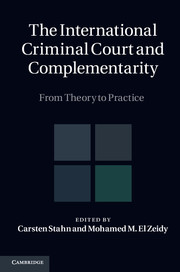Book contents
- Frontmatter
- Contents
- Acknowledgments
- Foreword by HE Judge Sang-Hyun Song
- Foreword by Patricia O’Brien
- Foreword by Silvia A. Fernandez de Gurmendi
- List of abbreviations
- Introduction: bridge over troubled waters?
- PART I General reflections
- PART II Origin and genesis of complementarity
- PART III Analytical dimensions of complementarity
- PART IV Interpretation and application
- PART IV (Continued) Interpretation and application
- PART V Complementarity in perspective
- 27 Horizontal complementarity
- 28 The International Criminal Tribunal for the former Yugoslavia (‘ICTY’) and the transfer of cases and materials to national judicial authorities: lessons in complementarity
- 29 Positive complementarity in practice
- 30 Complementarity of procedures: how to avoid reinventing the wheel
- PART VI Complementarity in practice
- Index
- References
29 - Positive complementarity in practice
ICTY Rule 11bis and the use of the tribunal's evidence in the Srebrenica Trials before the Bosnian War Crimes Chamber
from PART V - Complementarity in perspective
Published online by Cambridge University Press: 05 November 2014
- Frontmatter
- Contents
- Acknowledgments
- Foreword by HE Judge Sang-Hyun Song
- Foreword by Patricia O’Brien
- Foreword by Silvia A. Fernandez de Gurmendi
- List of abbreviations
- Introduction: bridge over troubled waters?
- PART I General reflections
- PART II Origin and genesis of complementarity
- PART III Analytical dimensions of complementarity
- PART IV Interpretation and application
- PART IV (Continued) Interpretation and application
- PART V Complementarity in perspective
- 27 Horizontal complementarity
- 28 The International Criminal Tribunal for the former Yugoslavia (‘ICTY’) and the transfer of cases and materials to national judicial authorities: lessons in complementarity
- 29 Positive complementarity in practice
- 30 Complementarity of procedures: how to avoid reinventing the wheel
- PART VI Complementarity in practice
- Index
- References
Summary
The principle of positive complementarity foresees a coordinated approach to the prosecution of crimes by the International Criminal Court (‘ICC’) and national authorities. The ICC Prosecutor has pointed towards a two-tiered policy to combat impunity. On the one hand, the Court will initiate prosecutions against persons who bear the most responsibility for the crimes under investigation. On the other hand, the ICC will encourage national trials, where possible, for the lower-ranking perpetrators. The concrete implementation of the positive complementarity regime will, in many cases, entail the use and admission of information and evidence collected by the ICC before national courts.
Under the International Criminal Tribunal for the former Yugoslavia (‘ICTY's’) Rule 11bis the principle of classical complementarity enshrined in the Rome Statute is reversed. The Referral Bench of the ICTY tests the adequacy of national systems to determine if cases are transferable to national courts for trial rather than deciding if they are admissible before the Tribunal. Since 2005, the ICTY has transferred six cases under Rule11bis to the Bosnian War Crimes Chamber for trial. The use of evidence collected by the ICTY in the Srebrenica trials before the War Crimes Chamber has proven invaluable to the success of the national proceedings and is an example of positive complementarity in practice. The challenges to the admissibility of the ICTY's evidence in proceedings before the War Crimes Chamber will be examined to highlight the lessons learnt from the Bosnian process. In addition, the Law on the Transfer of Cases from the ICTY to the Prosecutor's Office of BiH and the Use of Evidence collected by the ICTY in Proceedings before the Courts in BiH will be analysed as a model national legal framework for the implementation of a ‘reverse’ cooperation regime as foreseen under Article 93(10) of the Rome Statute.
- Type
- Chapter
- Information
- The International Criminal Court and ComplementarityFrom Theory to Practice, pp. 920 - 954Publisher: Cambridge University PressPrint publication year: 2011
References
- 1
- Cited by



